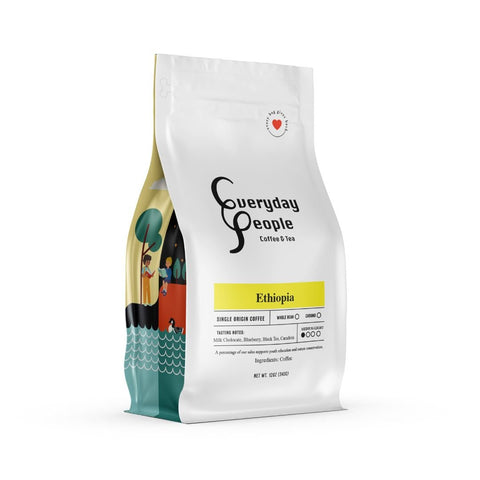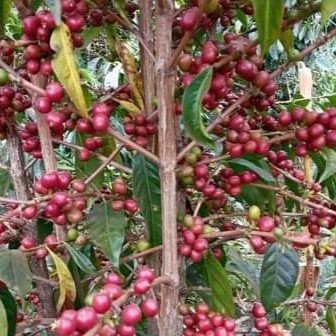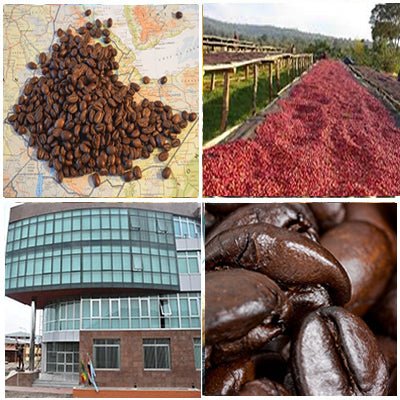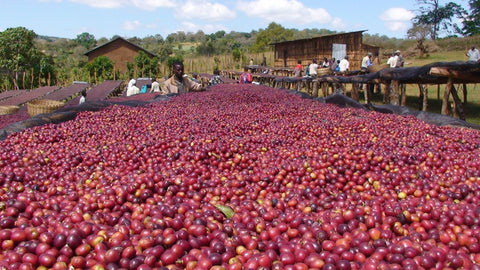Description
Experience coffee in its purest form with our Ethiopia Natural Single Origin, sourced directly from the birthplace of coffee itself. This exceptional medium-light roast showcases the ancient heirloom varietals of Ethiopia's Oromia region, where coffee has been cultivated for over 1,500 years. Through natural processing and careful sun-drying, this organic coffee preserves the wild, fruity characteristics that made Ethiopian coffee legendary around the world.
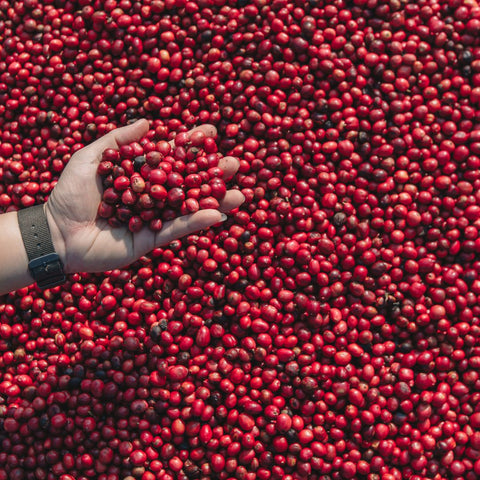
Details
Roast Level: Medium- Light Roast
Tasting Notes: Rich milk chocolate foundation, Bright fruity complexity, Sweet caramel finish, Wine-like acidity, Berry and citrus undertones, Floral aromatics
Process: Natural and Sundried
Grower: Oromia Coffee Farmers Cooperative Union (OCFCU)
Varieties: Local Heirloom - Sidamo
Altitude: 2,000-2,200M
Certifications: Conventional
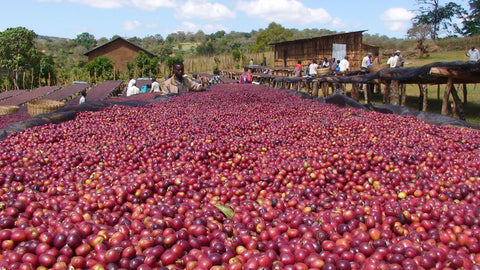
From the Birthplace of Coffee
Journey to the very birthplace of coffee with our Ethiopia Natural Single Origin, sourced from the ancient highlands of Oromia where coffee's story began over 1,500 years ago. According to legend, it was here in the Ethiopian highlands that the Oromo people first discovered coffee's energizing properties, initially using the cherries as food before developing the brewing traditions that would eventually spread across the globe.
The Oromia region of north-central Ethiopia remains coffee's spiritual home, where wild coffee trees still grow in their native forest environment. Our coffee comes from this legendary region through the Oromia Coffee Farmers Cooperative Union (OCFCU), established in 1999 to support the very farmers who are the guardians of coffee's ancient heritage.
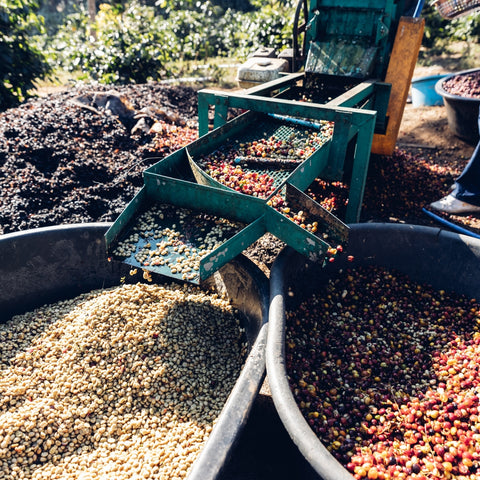
Empowering 557,000 Households
OCFCU represents one of the most successful farmer cooperative models in the world. Since 1999, they've grown from 34 cooperatives to 407, now supporting over 557,000 households across Ethiopia. Their democratic, member-owned structure ensures that an impressive 70% of net profits return directly to the farmers and their communities, transforming lives and providing access to education, healthcare, and infrastructure.
The natural processing method used for this coffee is as ancient as coffee itself. Whole coffee cherries are carefully selected at peak ripeness, then sun-dried on traditional raised beds for weeks. This time-honored technique allows the fruit's sugars to penetrate the bean, creating the complex fruity flavors and wine-like characteristics that Ethiopian naturals are famous for worldwide.
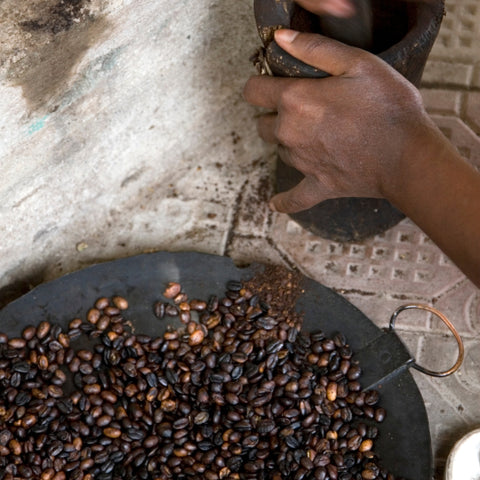
The Beauty of Coffee From Ethiopia
Our Ethiopia Natural showcases indigenous heirloom varietals that have grown in these highlands for millennia. These ancient varieties, including local Sidamo strains, cannot be found anywhere else in the world. Their genetic diversity and adaptation to Ethiopia's unique terroir create flavor profiles impossible to replicate, making each cup a direct connection to coffee's origin story.
At altitudes of 2,000-2,200 meters, these coffee trees grow slowly in the thin mountain air, developing dense, complex beans. The extreme elevation, combined with Ethiopia's distinctive highland climate and volcanic soils, creates the perfect environment for producing specialty-grade coffee that captures both the wild intensity of natural processing and the refined elegance of high-altitude cultivation.
Brewing Recommendations
Ethiopia Natural Single Origin • Medium-Light Roast
Pour Over (V60/Chemex)
Ratio: 1:16 (25g coffee : 400g water)
Grind: Medium (similar to sea salt)
Time: 4:00-4:30 minutes
Temperature: 195-200°F (90-93°C)
Bloom: 45-60 seconds with 2x coffee weight
Ethiopian Coffee Ceremony
Equipment: Clay pot (jebena) and pan
Grind: Fine powder by hand
Time: 15-20 minutes total ceremony
Roasting: Green beans roasted fresh over fire
Brewing: Three rounds (abol, tona, baraka)
French Press
Ratio: 1:14 (30g coffee : 420g water)
Grind: Medium-coarse
Time: 4:00 minutes steep
Temperature: 200°F (93°C)
Technique: Gentle stir at 1 minute, slow press
Cold Brew
Ratio: 1:8 (125g coffee : 1L water)
Grind: Coarse
Time: 16-20 hours at room temperature
Filtration: Double strain through fine mesh
Serving: Over ice, dilute 1:1 if desired
Understanding Natural Process Brewing
Optimal Temperature Ranges
Ethiopian Natural Coffee Tips
- Use filtered water with 150-300 TDS to preserve the delicate fruity notes and prevent mineral interference
- Medium-light roasts shine with slightly cooler water temperatures to avoid burning the fruit compounds
- Natural process coffees benefit from longer bloom times due to increased CO2 from extended cherry drying
- Store whole beans in airtight containers to preserve the volatile fruit-forward aromatics that define Ethiopian naturals
- Try multiple brewing methods to explore different aspects - pour-over for clarity, French press for body
- Consume within 2-3 weeks of roast date for peak fruit clarity and complexity
- Experiment with slightly coarser grinds to avoid over-extraction of the fruit compounds
- Consider the Ethiopian coffee ceremony for an authentic cultural experience and unique flavor profile
- Expect wine-like qualities and fruit complexity that may seem unusual if you're new to Ethiopian naturals
- Pair with light breakfast foods or enjoy black to fully appreciate the complex flavor profile
Frequently Asked Questions
Ethiopian natural process coffee is dried with the coffee cherry still intact, allowing the fruit's sugars to penetrate the bean over weeks of sun-drying. This creates intense fruity flavors, wine-like complexity, and sweet characteristics impossible to achieve with washed processing. Ethiopia is the birthplace of this ancient method, perfected over centuries by Ethiopian farmers.
Ethiopian heirloom varietals are ancient, indigenous coffee varieties that have grown wild in Ethiopia for over 1,000 years. These varieties exist nowhere else in the world and have incredible genetic diversity. Our Sidamo heirloom varietals create unique flavor profiles with complex fruit notes, wine-like acidity, and floral aromatics that cannot be replicated by modern cultivars.
Pour-over methods like V60 or Chemex work excellently with a 1:16 ratio and 195-200°F water to highlight the fruity complexity. Use a medium grind and allow for a 45-60 second bloom. French press brings out the full body and chocolate notes, while cold brew creates a smooth, sweet profile with enhanced fruit characteristics. Avoid over-extraction which can make natural coffees taste overly fermented.
While not formally Fair Trade certified, our Ethiopia Natural is sourced through the Oromia Coffee Farmers Cooperative Union (OCFCU), which operates on Fair Trade principles. OCFCU returns 70% of profits directly to farmers and their communities, supporting over 557,000 households. This democratic cooperative model often provides better compensation than traditional Fair Trade certification.
Natural process coffee is dried with the cherry intact, creating fruity, wine-like flavors with heavier body. Washed Ethiopian coffee has the cherry removed before drying, resulting in cleaner, brighter acidity with more floral notes. Our natural process emphasizes the sweet, fruity characteristics while maintaining Ethiopia's signature bright acidity and complex aromatics.
Ethiopia is coffee's birthplace with over 1,500 years of cultivation history. The country has incredible genetic diversity with thousands of wild heirloom varietals, ideal growing conditions at 2,000+ meter altitudes, and traditional processing methods perfected over centuries. Ethiopian farmers are the original coffee experts, and their ancient techniques produce flavors unmatched anywhere else in the world.
At 2,000-2,200 meters, coffee trees grow slowly in the thin air, allowing beans to develop more concentrated flavors and higher density. The extreme altitude creates temperature fluctuations that stress the trees, producing more complex sugars and acids. This results in brighter acidity, more intense fruit notes, and the clean, wine-like characteristics that Ethiopian high-altitude coffees are famous for.
Natural process means the coffee cherries are dried whole with the fruit still attached to the bean, rather than removing the fruit before drying. Over 3-4 weeks of sun-drying, the fruit's sugars ferment and penetrate the bean, creating sweet, fruity flavors. This ancient Ethiopian method produces complex, wine-like characteristics and heavier body compared to washed coffees.
Store in an airtight container away from light, heat, and moisture at room temperature. Natural process coffees are especially sensitive to environmental factors due to their fruit-forward characteristics. Use within 2-3 weeks of roasting for peak fruity complexity. Avoid refrigeration which can cause condensation and damage the delicate fruit oils that give natural coffees their distinctive character.
While this medium-light roast Ethiopian natural can be used for espresso, it's specifically crafted for filter brewing methods that showcase its fruity complexity. The bright acidity and fruit-forward profile shine best in pour-over, French press, or drip methods. For espresso, consider our darker roast blends that are specifically designed for concentrated extraction and milk-based drinks.

